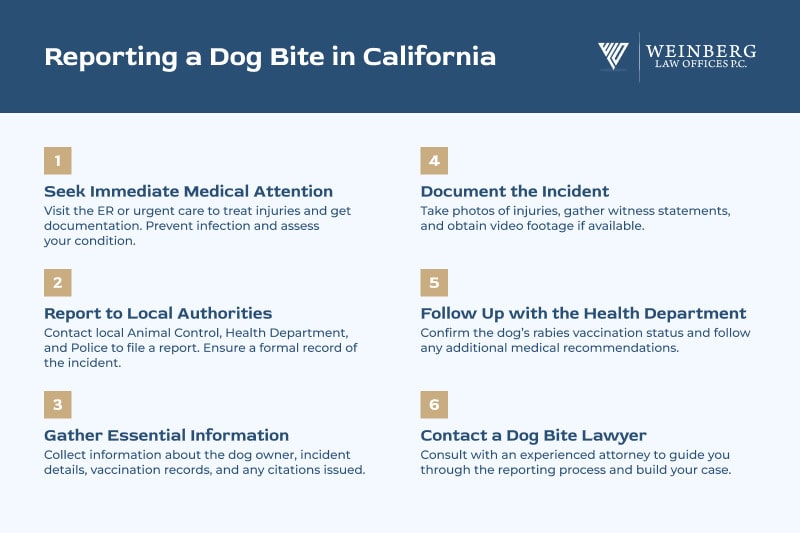The aftermath of a dog bite accident is typically overwhelming and chaotic for the victim and their families. Once you come to terms with the dog bite, you may want to know how to report a dog bite in California. You can report the dog attack to your local health department or police department.
In some cases, a dog owner is liable for the injuries their dog inflicts in an attack. Reporting a dog bite creates a record of the attack and preserves important information about the incident that can help your attorney build your case later in the process.

Where Do I Report a Dog Bite?
For reporting dog bites in California, reach out to your local Animal Control office for guidance on filing a report. Additionally, you may need to inform the local health department and police department about the incident. If possible, gather vet records to confirm the dog’s rabies vaccination status.
The police department will send an officer to collect information about the incident and create a police report. The police report will include information like:
- Name of the dog owner,
- Description of the incident,
- Location of incident,
- Contact information for the dog owner, and
- Whether the officer issued a citation.
The animal control agency will determine whether to quarantine the animal. They will also collect vaccination records from the dog owner to ensure their pet is up to date and cannot spread diseases.
The local health agency will coordinate with animal control for the vaccination status and determine whether the victim needs additional treatment to prevent infection.
What Should I Do After I Report a Dog Bite?
Reporting a dog attack is only the first step in the process of recovering compensation for your injuries. Our team provided recommendations for the actions you can take after filing a report.
Seek Medical Attention
Injuries caused by dogs can get infected if left untreated. The bacteria contained in a dog’s mouth can increase the risk of infection and impact your medical treatment plan. Some dog attacks may require treatment in the emergency room.
If you do not seek emergency treatment, you should go to urgent care or schedule an appointment with your general practitioner to evaluate the injuries. The doctor will still complete a medical assessment and give you documentation to prove your injuries.
Document Relevant Evidence
The trauma inflicted by a dog attack can make the details start to fade almost immediately.
Make a record of what happened during the incident and preserve whatever information you can to give to your lawyer. Take photographs of the injuries caused by the dog to document the wounds.
Ask any businesses or residences nearby if they captured video footage of the incident and request a copy. Collect statements from anyone who witnessed the attack. The evidence you preserve at the scene can benefit your ability to recover the full extent of your losses.
Contact Weinberg Law Offices for a Free Consultation to Discuss How to Report a Dog Attack in California
No one expects to suffer injuries in a dog attack. Unfortunately, sometimes a dog attack is unavoidable.
A qualified California dog bite attorney can guide you through the process of reporting a dog attack and start collecting information to build your case.
Our attorneys at Weinberg Law Offices have handled multiple cases involving dog bite injuries and know how to guide our clients through the reporting process.
Our attorneys will fight aggressively to secure a settlement that fully reimburses you for your losses. We will compile documentation to calculate the value of your damages to ensure the settlement offer is fair.
If you or a loved one was injured in a dog attack, contact an attorney at Weinberg Law Offices today to schedule an appointment with an attorney.
Disclaimer: This content should not be construed as legal advice.
